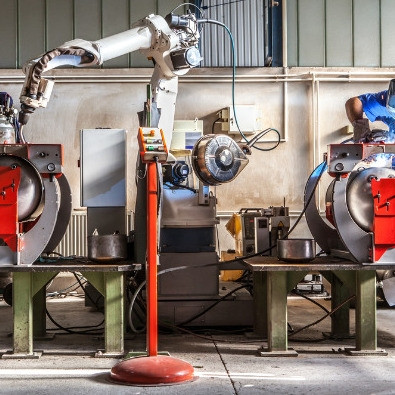Search vacancies

Introduction
It isn’t easy to articulate the profound effect that Covid-19 has had on business ecosystems across the globe.
The pandemic has been a human tragedy, but it has shone a light on the weaknesses of businesses everywhere, including a lack of protection planning.
AI and robotics have been threatening to disrupt supply chains for years. Is now the time for them to make a real difference?
Let’s take a look at how robotics and AI are currently influencing supply chain organisations, and how we can expect this to change as we adjust to a post-pandemic world.
The Role of Robotics in Supply Chains
Last year, Oxford Economics released a report which predicted that robots would replace 20 million global manufacturing jobs over the coming decade.
Replacing robots with people has always been a contentious issue, with fears that poorer and low-skilled workers will be disproportionately affected.
But whether these fears will be validated has yet to be seen. There is a current theory which suggests that, instead of replacing the need for humans, robotics displaces workers, and jobs are actually created due to an increase in productivity, thanks to the robots.
As it stands, around 80% of warehouses are manually operated without any automation support. As is the case around the world, the real problem organisations face is not a shortage of robots, but a lack of employees with the right skills.
China, for example, owns a fifth of the world’s industrial robots. With increased productivity, its economy has been strengthened, not weakened because of this.
Staying with China, let’s look at how the Covid-19 outbreak has exposed the cracks in global supply chains.
Broken Supply Chains: At the Mercy of Nature
The Covid-19 outbreak highlighted the lack of transparency many business owners have over their supply chains.
A sudden problem at one level of the supply chain that was not recognised or predicted can, and has caused chaos for organisations, especially food manufacturers. In the US, this has been a particular problem. The Chairman of US meat company Tyson Foods said in April “The food supply chain is breaking” as broken links caused the permanent closure of several companies.
While business owners can say no-one could have predicted the coronavirus outbreak, when used, risk mitigation AI and algorithms can highlight these potential issues. This HBR article points out that despite numerous natural disasters over the last decade, most companies were willfully unprepared for the supply chain disruption caused by Covid-19.
But if it wasn’t Covid-19, it might have been another natural disaster. The Japanese earthquake, Iceland’s volcano, hurricanes and floods – all of these natural forces are a genuine threat to supply chains that, if business leaders continue to ignore, they do so at their peril.
Using AI to Build Resilient Supply Chains
Despite recent leaps in technology, many supply chains are a long way off being entirely digital, and thus, fully transparent. Many organisations have been working towards having digital control over their supply chains, but the recent crisis has turned what was once a distant dream into a much-needed reality.
Businesses will need to use probabilistic AI to create discrete event simulations, which will identify supply chain risks and vulnerabilities which could lead to supply chain breakdowns.
Rob Harrison, managing director for Sap Concur, says here, “Technology is the only way to have visibility into assets across extended supply networks”.
As a great deal of supply chain and procurement is built on relationships, it is easy to understand that experts in these fields are dubious about allowing an algorithm to make business-critical decisions.
But what businesses must remember is that human decision making is flawed.
In the US judicial system, for example, luck and bias have been found to play a significant role in human decision-making.
Studies found the same judges often gave different decisions to the same cases on different days, judges don’t like to give the same results too many times in a row, and worryingly, even local sports teams losing were found to impact on decisions.
So how can humans and AI come together in harmony to support decision-making?

Intrigued? Let’s talk
To find out how our tried, tested and trusted insight and innovation can deliver you the brightest sales and marketingtalent call
01905 381320 or email info@martinveasey.com.
Remembering the Limits of AI
Speaking at the recent virtual CIPD Festival of Work, leading mathematician Hannah Fry talked about the importance of using automation to play to human strengths.
Logistics managers can use AI to make themselves aware of the fragility of their supply chains, to make industry-led comparisons and to highlight objective challenges and opportunities. The supply chain manager then must apply these findings with a human overview.
AI needs to work alongside humans to produce better outcomes, not to be used as a one size fits all tool. The human element is essential to remember, especially when it comes to the aspects of a business that rely on interpersonal connections, something which, as of yet, there isn’t an algorithm for.
What Next?
Strong interpersonal connections are vital for success in your organisation.
As recruiters with over 35 years’ experience, we are experts at finding the right talent for your supply chain organisation. Get in touch with us today on 01905 381320 or contact us here to find out how we can help you recruit your next supply chain and logistics experts.
Thanks,
Roheela
About Martin Veasey Talent Solutions
The Secret to your Success is Hiring Exceptional Talent. Our Talent is helping you find it.
-
A 35-year track record successfully recruiting for blue chip and SME businesses both in the UK and Internationally.
-
Essentially, we match exceptional talent with excellent jobs. We have a reputation for proactively finding and placing hard to reach talent into our clients’ businesses.
-
Martin Veasey Talent Solutions have a unique expertise in hiring managerial, professional, technical, functional specialists and senior executive roles, including complete teams both in the UK and internationally.
-
We place a strong emphasis on developing partnerships that enable us to get to know your business objectives, your challenges and your specific requirements.
-
We then create a tailored campaign that delivers the best talent to add value and become an integral part of your business growth and success.
-
We have invested in State of Art recruitment technology to ensure that we are always able to source the best talent, both passive and active, for our clients’ key roles.
-
Our Recruitment Solutions division is complemented by our Talent Management Solutions division, which offers talent strategy planning, psychometric testing and executive coaching.
Business Sectors – Board & Senior, Supply Chain & Logistics, Purchasing, Manufacturing & Engineering, FMCG & Retail, Pharma & Life Sciences, Sales & Marketing, Human Resources, Construction & Civils, Interim Executives
Divisions: Recruitment Solutions & Talent Management Solutions
So if you are looking to work with a highly accomplished recruiting partner, please call us on 01905381320 or get in contact today.
Intrigued? Let’s talk
To find out how our tried, tested and trusted insight and innovation can deliver you the brightest sales and marketingtalent call
01905 381320 or email
info@martinveasey.com.
I am highly recommending any candidates to work with Martin Veasey Talent Solutions, as they understand the candidate career objectives and match the skills required with the desired employer.